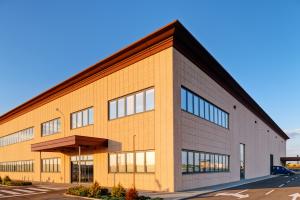Essential Guidance for First-Time Franchise Build-Outs: Permits, Codes, Corporate Guidelines, Budgeting Overview
Elwin Ordoyne, Vice President of E.C.O. Builders Inc., underscores the importance of an integrated approach to franchise build-outs. “Coordination among permitting authorities, corporate guidelines, and construction teams is essential,” said Ordoyne. “Ignoring any single element may result in delays, cost overruns, or non-compliance issues that can impact both brand reputation and financial performance.”
1. Permit Acquisition and Zoning Compliance
Franchise build-outs typically demand multiple permits, including zoning, building, plumbing, electrical, and health department approvals for certain businesses. Initial tasks involve verifying property suitability under local zoning laws and submitting detailed construction drawings for jurisdictional approval.
Zoning verification ensures proper land use and access requirements are met. Building departments often require site plans, floor plans, structural engineering designs, and mechanical schematics. Early engagement with municipal officials can prevent hold-ups and help align build-out plans with local regulations.
2. Building Codes and Safety Standards
Meeting local building codes is a non-negotiable component of franchise build-outs. Codes govern structural integrity, fire suppression systems, egress pathways, ADA accessibility, HVAC systems, and lighting levels.
Safety measures—such as fire alarms, rated walls, exit signage, sprinkler systems, and barrier-free facilities—address both life-safety and accessibility requirements. Coordinated reviews by architects, engineers, and contractors ensure compliance during inspections and final sign-off.
3. Corporate Brand Standards Integration
Franchise agreements typically include corporate brand guidelines covering architectural design, finish selections, signage, customer flow, and operational efficiency. Strict adherence to approved layouts supports brand consistency across locations.
Compliance often involves coordination with franchisor-approved suppliers and adherence to brand-specific lighting levels, fixture types, color palettes, and seating configurations. Construction teams must manage these specifications alongside local build regulations.
4. Budget Planning and Cost Allocation
Comprehensive budgeting is essential to avoid financial surprises. Primary cost categories include:
Hard Costs: Site preparation, demolition, framing, drywall, electrical, plumbing, HVAC, finishes, flooring, lighting, signage, and permits.
Indirect Costs: Architectural and engineering fees, permit expenses, utility connections, inspection costs, and contractor overhead.
Contingency Funds: Allocated at 10–15% of the total budget to address unforeseen site conditions or corporate-mandated changes.
Budget management requires early vendor selection, bid comparisons, and regular cost tracking. Construction procurement strategies (e.g., competitive bidding or negotiated contracts) help balance price and quality.
5. Project Timeline and Sequencing
Franchise build-outs follow a phased progression:
Pre-construction: Site surveys, corporate approvals, drawings, engineering, and permitting.
Demolition/Turnkey Prep: Removal of existing structures and hazardous materials, followed by utility shutdowns.
Structural & Shell Work: Framing, roofing, exterior walls, and structural components.
Interior Systems: Rough-in for electrical, plumbing, HVAC, followed by insulation and drywall.
Finishing: Flooring, painting, fixtures, signage, and corporate branding elements.
Testing and Commissioning: Systems testing (fire, electrical, mechanical), code inspections, final approvals.
Handoff Process: Final review, punch list completion, equipment vetting, and occupancy permit issuance.
Maintaining on-site communication and coordination among permitting officials, corporate representatives, subcontractors, and suppliers is crucial to avoid delays.
6. Quality Assurance and Inspection Processes
Regular on-site inspections ensure work meets code and design intent. Coordination includes city inspectors, fire marshals, and corporate compliance reviewers. E.C.O. Builders specialists recommend:
Documented punch lists at major milestones
Photo and date-stamped site records
Weekly progress meetings
Pre-inspection reviews for code readiness
7. Risk Management and Liability Considerations
Insurance coverage essential to franchise build-outs includes general liability, workers’ compensation, builder’s risk, and permitted subcontractor-specific policies. Contractual clarity regarding insurance requirements ensures clarity on safety protocols, indemnity, and financial protection.
Strategies to reduce risk involve regular safety audits, staff orientation on fall protection, and consistent housekeeping practices. Compliance with local regulations on stormwater management and environmental protection is also essential.
8. Handover and Ongoing Support
Franchise handoff involves verifying that all permits have been closed and occupancy certificates received. A turnkey build-out includes a documented walkthrough to confirm systems (plumbing, electrical, HVAC) and corporate specifications are operational.
Beyond completion, post-handover support may include minor warranty repairs, seasonal maintenance scheduling, and assistance with vendor relationships.
Elwin Ordoyne emphasizes that franchise build-outs provide opportunities but require careful planning. “First-time franchisees benefit from a management framework that integrates permitting, design, scheduling, costs, and quality control,” said Ordoyne. “A coordinated approach helps new locations open on schedule and operate reliably within brand and regulatory standards.”
Morgan Thomas
Rhino Digital, LLC
+1 504-875-5036
email us here
Visit us on social media:
Facebook
Legal Disclaimer:
EIN Presswire provides this news content "as is" without warranty of any kind. We do not accept any responsibility or liability for the accuracy, content, images, videos, licenses, completeness, legality, or reliability of the information contained in this article. If you have any complaints or copyright issues related to this article, kindly contact the author above.
LightBulbSurplus.com Expands LED Driver Selection with Over 212 Models Now Available
Medical Supplierz Partners with Leading Healthcare Brands to Expand Product Listings
Silicon Wafer Manufacturing Plant Setup Cost 2025: Investment, Machinery and Profit Margin
Więcej ważnych informacji
 Jedynka Newserii
Jedynka Newserii

 Jedynka Newserii
Jedynka Newserii

Handel

Polskie MŚP otrzymają większe wsparcie w ekspansji międzynarodowej. To cel nowej inicjatywy sześciu instytucji
Firmy z sektora małych i średnich przedsiębiorstw otrzymają kompleksowe wsparcie na potrzeby zwiększania konkurencyjności na arenie międzynarodowej. Taki jest cel wspólnej inicjatywy instytucji zrzeszonych w Grupie PFR pod szyldem Team Poland. Obejmuje ona zarówno wsparcie kapitałowe, w postaci gwarancji, pożyczek czy ubezpieczenia, jak i doradztwo oraz wsparcie promocyjne i informacyjne, dzięki czemu mikro-, małym i średnim firmom łatwiej będzie podjąć decyzję o ekspansji zagranicznej. Pierwszy projekt dotyczy wsparcia dla firm zainteresowanych uczestnictwem w odbudowie Ukrainy.
Bankowość
RPP zgodna co do potrzeby obniżania stóp procentowych. Trwają dyskusje dotyczące tempa tych decyzji

W lipcu Rada Polityki Pieniężnej po raz drugi w tym roku obniżyła stopy procentowe, określając swój ruch mianem dostosowania. W kolejnych miesiącach można oczekiwać kolejnych obniżek, ale ich tempo i termin będą zależeć od efektów dotychczasowych decyzji i wzrostu płac. Docelowo główna stopa procentowa ma wynosić 3,5 proc. Te okoliczności sprzyjają kredytobiorcom.
Handel
Umowa z krajami Mercosur coraz bliżej. W. Buda: Polska nie wykorzystała swojej prezydencji do jej zablokowania

– Polska podczas prezydencji w Radzie UE nie wykorzystała szansy na obronę swoich interesów w sprawie umowy z krajami Mercosur – ocenia europoseł PiS Waldemar Buda. W jego ocenie polski rząd, mimo sprzeciwu wobec zapisów umowy, nie zbudował w UE sojuszy niezbędnych do jej odrzucenia. Porozumienie o wolnym handlu spotyka się przede wszystkim z protestami europejskich rolników, którzy obawiają się zalania wspólnego rynku tańszą żywnością z krajów Ameryki Południowej. Według europosła wszystko może się rozegrać w najbliższych tygodniach.
Partner serwisu
Szkolenia

Akademia Newserii
Akademia Newserii to projekt, w ramach którego najlepsi polscy dziennikarze biznesowi, giełdowi oraz lifestylowi, a także szkoleniowcy z wieloletnim doświadczeniem dzielą się swoją wiedzą nt. pracy z mediami.





![Część środków z Planu Społeczno-Klimatycznego trafi na walkę z ubóstwem transportowym. Organizacje branżowe apelują o zmianę priorytetowych projektów [DEPESZA]](https://www.newseria.pl/files/1097841585/rower3,w_85,_small.jpg)




.gif)

 |
| |
| |
|